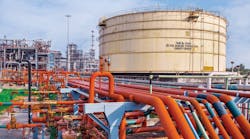Curtis Williams
OGJ Correspondent
PORT OF SPAIN, June 20 -- After more than a year of negotiations, Trinidad and Tobago has granted approval to the partners in Atlantic LNG Co. of Trinidad and Tobago to proceed with the construction of LNG Train 4—the largest single LNG train in the world.
The announcement was made Monday by the Caribbean island's Prime Minister Patrick Manning who told the country's Parliament that the nation's treasury stood to benefit more from this agreement than it did with the construction of LNG Trains 2 and 3.
But in making the announcement, it remained unclear if Tractebel Trinidad LNG Ltd. would be part of the expansion project; the Tractebel unit's last-minute discussions with its other Atlantic LNG partners had reportedly delayed the announcement about Train 4 by nearly 2 months.
Project benefits, costs
Manning said the Cabinet approved the Train 4 project on June 12 with an agreement that would earn his country more than $250 million/year for the duration of the 20-year contract. "With a processing capacity of 800 MMcfd, (this project) will, starting in 2008, earn direct revenue of $1.5 billion/year for the duration of the contract," Manning said. Total government take at the wellhead is estimated to average $1.02 billion/year at projected natural gas reference prices.
Train 4 will cost $1.2 billion to build and construction will start in August. No tax holiday will be granted, Manning said.
All taxes will be paid to the national treasury and corporate taxes are projected to exceed those from Trains 2 and 3 by 10¢/MMbtu of LNG produced.
The proposed Train 4 expansion will be located south of the three existing trains at Point Fortin, on Trinidad and Tobago's southwestern coast.
Manning told the Parliament that construction of the new plant will employ 2,400 people and he indicated that the Cabinet also had agreed to a gas supply arrangements relating to the expansion put forward by some of the other project partners, namely, British Gas Trinidad LNG Ltd., Repsol-YPF SA unit Repsol LNG Port Spain BV, and Trinidad and Tobago's National Gas Co. (NGC).
Atlantic LNG recently said in a statement that all Train 1 shareholders—BP PLC, BG, NGC, Repsol-YPF, and Tractebel—had an option to participate in Train 4 ownership. But there is a provision in the agreement stating that should a shareholder opt out of the expansion project, their interest will be taken up by the other shareholders.
Project 'close monitoring'
The Caribbean island's prime minister, who had threatened to refuse to sanction the project should his country not get its fair share of the profits from Train 4, announced that Atlantic LNG's operations will undergo close monitoring.
He said for Trinidad and Tobago to benefit from the agreement, a high level of monitoring of LNG shipments, production operations, and market conditions was vital. "When one considers the sheer volume and complexity of the present and proposed agreements of LNG operations in the country, the need for a dedicated monitoring body has emerged as an urgent priority," he said, adding, "This is crucial to realizing the revenues that are expected from the projects and importantly will ensure that any additional revenue earned via various LNG marketing mechanisms is captured."
As a result, a very salient feature of the agreement is the corporate structure, which is different from that of the other LNG trains. "On this occasion, we have agreed that a new and separate company will own Atlantic LNG Train 4," Manning stated. "The new structure allows for the full payment of taxation and the company wills 'ring-fenced' allowing the government to maximize its revenue from taxation," he added.
Such a monitoring organization must have suitable equipment to ensure confidence and accuracy of figures produced. "This is an urgent matter the government is moving with dispatch to have such an organization established," Manning said.
Project details
Train 4 is projected to produce 5.2 million tonnes/year of LNG. Construction of a second jetty and fourth storage tank will also be undertaken. A new, 56-in. pipeline is planned as well. The average gas consumption of the train is expected to be about 800 MMscfd of gas.
Atlantic LNG's Train 4 will increase the production capability of the Point Fortin facilities to nearly 15 million tonnes/year, increasing significantly the island country's ability to further the development of natural gas-based industries, particularly those dependent on NGLs and ethylene.
